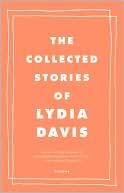A Cure for Insomnia

I don't suffer from insomnia, and if I hang onto this book I will never have to worry about it. It's required reading for a class, and probably nothing I'd have picked up on my own. I don't know how half the crap written in this book even passes for fiction or stories. They come across mostly as essays, or thoughts written by someone who appears to be the author (for the most part) - often a female, with some frequency a translator or person familiar with French (Davis is also a translator of French works). In this book of 731 pages, I did find a few stories interesting, a little bizarre, and even, as an aspiring writer, inspiring (in fact, maybe the best thing to come out of this book is that when I woke up this morning I awoke thinking that if these were what constitute short stories, I sure as hell can write one! And I started one that's just going so well right now, knock wood!).
For some reason the constant heteronormativity of the stories bothered me, too, and I'm not sure why, exactly. Most of the books I read center on heterosexual people. Perhaps it's the tone of many of the "stories," the imperatives used, or maybe it's that there are so many stories in this book that I would have liked to see a bit more variety in the subjects -- but, as I said, while I can't prove that these things aren't fiction (there are some which are clearly fiction), too many of them seem like essays or just thought fragments of the author. So if she's drawing on her own experience, then that would explain the hetero bit, supposing, of course, that she's heterosexual.
I'm going to copy a couple samples of these stories so you know why this book sucks so incredibly badly.
Disagreement "He said she was disagreeing with him. She said no, that was not true, he was disagreeing with her. This was about the sreen door. That it should not be left open was her idea, because of the flies; his was that it could be left open first thing in the morning, when there were no flies on the deck. Anyway, he said, most of the flies came from other parts of the building: in fact, he was probably letting more of them out than in." (p. 201)
Tropical Storm "Like a tropical storm,/I, too, may one day become better "organized." (p. 520).
While these kinds of stories are the best because they don't drag on and on and on, it makes me wonder: how the hell did she get so much praise?! I don't get it.
If you're curious and want to read some of the dumbest things from this book, I'd recommend the stories Southward Bound, Reads Worstward Ho, How it's Done (which is a paragraph account of heterosexual sex, in case anyone just had to know how to fuck), We Miss You, a make-believe study of a class of fourth graders in 1951 and the letters they wrote to a friend in the hospital. It has moments of interest, but Davis tries hard to make it come across as a study, and she succeeds: since when is a study of much interest to read except to people who give a shit about the study? (She even describes the kind of paper used, and the unnamed author of the study goes into handwriting analysis.) Grammar Questions,
Pastor Elaine's Newsletter, Thyroid Diary. Some stuff that begins with promise fairly quickly descends into boringness.
There are a few good stories in this collection: The House Behind and Mrs. D and her Maids. There may be a few more but I don't much care to look them up just now.
Anyway, I've been reading this for a week and a half or so and just finished, and I feel like I've been released from a severe punishment!